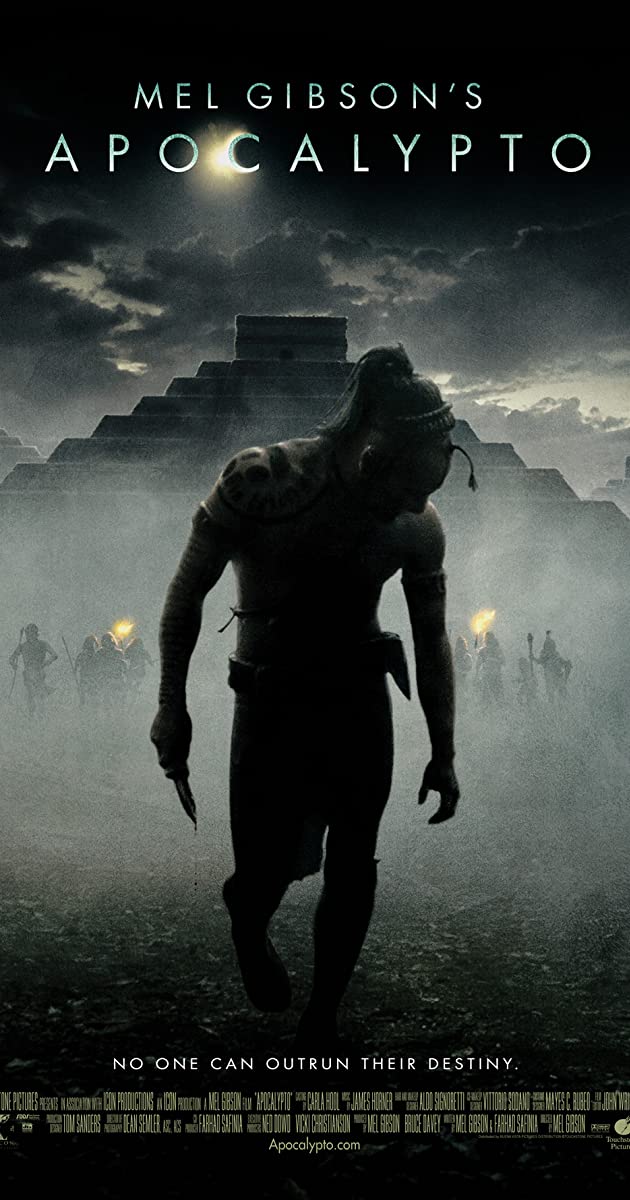If the function of movies is to stimulate the mind, Mel Gibson’s Apocalypto is a spectacular failure. Fortunately, it is not. It is the critic’s job to translate into language the efficiency of the aesthetic forms. This time, I bet they will not be doing it accurately, upon a movie as extreme and iconoclastic as Apocalypto. Maybe they will not understand it. Excuse me! I wanted to say: THEY WILL NOT FEEL IT. Let me try a little explanation of my own.
At the beginning, after a hunt, the Mayan tribe is resting around the fire and the old sage is telling an ancestral tale. It is about how men had been initiated to the primal secrets of the universe by the animals and how, even though they possessed all the responses, their deep thirst of the soul had not been quenched. Here Gibson discloses quite clearly the thematic base of the story. But starting his film by an explosive hunting scene, he defines quite clearly the aesthetic frame through which his narrative will be depicted, too. Hence, Apocalypto is a fucking action film raving for blood. However, the intentness and sincerity that Gibson applies to his filmmaking elevates this journey on the screen over the standard height of ordinary action films. Indeed, he did not try to please neither the popcorn moviegoer, nor the trendy “I-can’t-appreciate-an-image- by-myself” critics, but just himself, in a sadomasochistic way that evokes some of his famous creations as an actor (The Road Warrior, Lethal Weapon, Payback).
Even tough Braveheart had been constructed on the same peculiar personal impulse as Apocalypto, its medieval guises had assured it a big box-office success. But nobody likes Mayan history, except historians. And surely they will not find what they’re looking for. The reconstitution of the old world of this dead civilisation interests Gibson in the same way that the legend of the Scottish warriors did: because they leave him free to create pagan and mythological combat sequences in which the principles and laws of the contemporary occidental world have been evacuated. To return at the source of human nature, he has to search inside worlds in which Nature keeps its place. On the steep mountains of Scotland or through the tangled jungle of the Mayan empire, Mel Gibson’s characters plunge into a primal trance and use edged weapons to pour the blood of their own species.
What is it all about? Nothing else than that. It is sufficient. Apocalypto is an action film, less lyrical than The Last of the Mohicans and virtuoso than Predator (its visual references), but crazier than both of them. It exposes the rage, pain and limit of the human body into a fascinating raw bareness. Gibson’s acute camera wins its challenge with the powerful expression of a true (and mad) “auteur de cinéma”. No one can deny this. It is a statement that anyone who has watched the screen rightly could not refute. SO, WATCH THE SCREEN RIGHTLY!

Kevin L.:
Jean Carlo did a good job of summing up the raw power of “Apocalypto”, but I still want to add a few of my thoughts about this wonderfully batshit insane flick. There’s definitely a Predator vibe, with the hunter hero becoming the hunted and, eventually, turning the (sacrifice) tables again and showing his hunters what hunting is really about! And on top of the jungle action, there’s also quite a bit of “Predator”-style male bonding and rowdy humor.
There’s also an Aguirre, The Wrath of God thing going on, in the way it gives you the feeling that Mel Gibson didn’t recreate the Mayan empire with special effects and movie magic but actually went back 500 years in time and captured all the glory and barbarism on display with his high-definition Genesis cameras. Likewise, the film fully embraces, Herzog-style, the madness and the violence that Man is capable of. And it’s not just Man against Man, but also Man against Nature. When you get down to it, Man is just another animal, after all. Woman is not forgotten either, as the male struggles are juxtaposed with the most essentially female ones, namely childbirth and motherhood.
Beyond those influences, Gibson’s own artistic voice resonates loud and clear, from his rather disturbing sense of spirituality and mysticism to his idea of honor versus fear and his fixation on purity through pain. “Apocalypto” is filled with amazing sights and riveting sequences and, while it is indeed somewhat simplistic as far as plot and character go (which is also true of Braveheart and The Passion of the Christ), its often purely visual action storytelling has got a relentless drive that is indeed undeniable.
Posted on December 8, 2006January 4, 2014Author Jean Carlo LavoieCategories Movie Reviews

